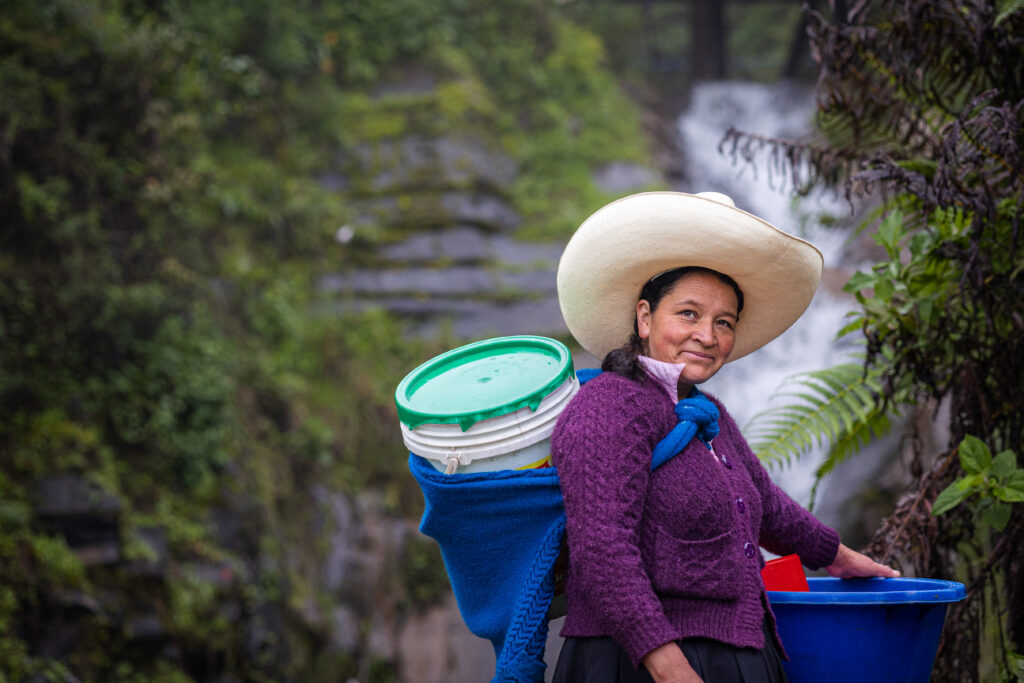The history of indigenous women in Latin America is a story full of courage, wisdom and perseverance. It reflects their fight for the preservation of the water, culture and nature they have in their countries. On International Indigenous Women's Day, we honor their resilience and work in finding solutions to the water crisis and their fight for respect for human rights in their country and beyond.
The importance of water and human rights
In a world where access to water is a crucial human right; Indigenous women are on the front lines of the fight for justice for their access and care. With more than 37 million people lacking access to drinking water in Latin America*, these women have assumed the role of protectors of natural water resources and defenders of universal access to water. Its leadership is based on the vision of water as a shared good. Which is also vital for the survival and dignity of all people.
Water as a Source of Life and Wisdom
For indigenous communities in Peru, water is much more than just a liquid. It is a symbol of life, a vital resource that nourishes both bodies and spirits. Because of this, indigenous women have played a central role in water management and preservation for generations. Their traditional knowledge of rain cycles, water sources and conservation is critical to maintaining water sustainability in a world facing increasing environmental challenges.
Challenges for indigenous communities
Indigenous communities are the most affected by the water crisis. This is due to historical inequalities and factors such as economic marginalization and environmental degradation. But for these communities, water is not just a source of physical life. It is also a crucial spiritual and cultural component. However, limited access to clean water undermines these deep connections and threatens their holistic well-being.

Leadership and defense of rights in a world in crisis
Indigenous women do not only face these difficulties. They also play an essential role in the fight for social and environmental justice. In the midst of adversity, they lead movements to defend territories and natural resources. To do this, they face mining, logging, oil companies, polluting companies and more. In addition, they fight poverty and gender violence, demonstrating incomparable resilience that inspires other women to unite and overcome fear.
The Right to Water in the Global Agenda
The recognition of the human right to water and sanitation in 2010 by the United Nations marked a crucial milestone. In the 2030 Sustainable Development Agenda, this right is reinforced as a specific objective. However, this commitment must be accompanied by strategic principles such as participation, inclusion, equality and non-discrimination. This is in order to ensure that no one is left behind in the search for a sustainable and fair future.
Challenges and Solutions: The Role of Indigenous Women
Despite progress, significant challenges remain. Indigenous women face threats to their rights and well-being, including in the defense of water and territory. But through resistance, mobilization and building solidarity, they are building a path towards development that protects life and natural resources. His leadership exemplifies the need for an approach that values water not only as an economic good, but as a universal right.
a drop of hope
In the midst of the adversity that indigenous communities face in their fight for access to water, a drop of hope emerges. Through its comprehensive and participatory approach, Water For People joins these communities. Respecting their cultures and listening to their voices. With projects ranging from the construction of drinking water systems to hygiene and sanitation education; They are making a difference in the lives of thousands of people.
Finally, we invite you to be part of this transformation. Your support can make the difference between famine and abundance, between struggle and dignity. To the donate to Water For People, you directly contribute to the creation of a world where all people, regardless of their origin, have access to clean, safe water. Together, we can weave a future where Indigenous women continue to be guardians of water and culture, without the unfair burdens they face today.
*Organization of American States, 2023
